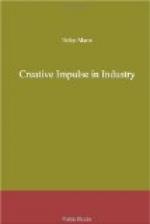INTRODUCTION
A friend of mine in describing the Russian people as he observed them in their present revolution said it was possible for them to accept new ideas because they were uneducated; they did not, he said, labor under the difficulty common among educated people of having to get rid of old ideas before they took on new ones. I think what he had in mind to say that it is difficult to accept new ideas when your mind is filled with ideas which are institutional. The ideas which come out of formal education, out of the schools, out of books, are ideas which have been stamped as the true and important ones; many of them are, as they have proved their worth in service. But as they represent authority, they pass into a people’s mind with the full weight of an accepted fact. The schools, the colleges, and the books are not responsible primarily for the fixed ideas; every established institution contributes fixed ideas as well as fixed customs and rules of action. The schools and colleges circulate and interpret them. The movement for industrial education in the United States is an illustration of this.
The ideas which we find there have not sprung from schools or colleges but from industry. The institution of industry, rather than the institution of education, dominates thought in industrial education courses. It is the institution of industry as it has affected the life of every man, woman and child, which has inhibited educational thought in conjunction with schemes for industrial schools. No established system of education or none proposed is more circumscribed by institutionalized thought than the vocational and industrial school movement.
Educators have opposed the desire of business to attach the schools to the industrial enterprise. They have rightly opposed it because industry under the influence of business prostitutes effort. Nevertheless, hand in hand with industry, the schools must function; unattached to the human hive they are denied participation in life. Promoters of industrial education are hung up between this fact of prostituted industry and their desire to establish the children’s connection with life. They have tried to meet opposing interests; they have not recognized all the facts because the facts were conflicting, and their minds as well as their interests, institutionally speaking, were committed to both.
This was the impasse we had apparently reached when the war occurred; it is where we still are. But ahead of us, sometime, the war will end and we shall be called then to face a period of reconstruction. The reconstruction will center around industry. The efficiency with which a worker serves industry will be the test of his patriotic fervor, as his service in the army is made the test during this time of war. All institutions will be examined and called upon to reorganize in such ways as will contribute to the enterprise of raising industrial processes to the standard of greatest efficiency.




